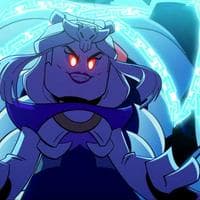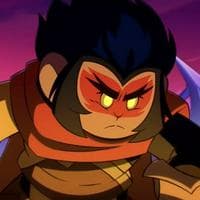Liù ěr Míhóu "Six-Eared Macaque" MBTI Personality Type
Personality
What personality type is Liù ěr Míhóu "Six-Eared Macaque"? Liù ěr Míhóu "Six-Eared Macaque" is an ISFP personality type in MBTI, 4w3 - sx/so - 468 in Enneagram, RLUEI in Big 5, ILE in Socionics.
[1/9] Before you begin reading, note that I’m partnering up with user @chryier so pay mind to their arguments as well. Throughout this comment, I’ll use examples from past comments in case you haven’t seen them, but if you’re familiar with my other comments you may recognize some parts of this one big comment I’m forging. Also, don’t mind if I surpass the word limit. ;-) POSSIBLE SPOILERS FOR SEASON 4!! This one is for those who base their unproductive arguments with Reddit posts and minimal knowledge about typology stereotypes: Beginning with functions, I’m gonna break down FiSe for Macaque and why ISTJ functions contradict the way Macaque behaves, along with correlating FiSe to the sexual 4 enneagram. I’ll start by abolishing the Si arguments, and how it contradicts everything Macaque believes in; I’ve read multiple, similar arguments where they talk about how Macaque’s a Si user solely because of him being “obsessed” with the past. See, here’s the thing - Macaque STRUGGLES with the past and obsesses over Wukong. Not necessarily about the past itself, but WHO affected it so deeply. There hasn’t been one broad argument about Macaque actively using Si; With Si users, objects move towards them rather than Si users approaching them, letting themselves get absorbed by impressions and generally be collected, passive and under-reactive, which is the very opposite of what Macaque is. This directs me to Se - Se users are action oriented, impulsive, explosive and over-reactive, and want sensory stimulation, which are very easy ways to describe Macaque. He is a prime example of a Se user, often engaging in battles impulsively without a coherent plan, as seen MULTIPLE times: Battling with MK or SWK, attacking MK’s gang, chasing them to the palace of the east sea; in addition to his outrageous battles, I’ll add that Macaque seeks sensory experiences and one of the prime examples I can provide is how he over-stalls battles that had multiple chances of being won. He stalls them for one sole purpose - experiencing and witnessing his opponent’s full potential. He ENJOYS angering and provoking his opponents just to see what they can offer. Another common thing I’ve encountered in similar arguments for ISTJ, is how Macaque uses “unhealthy Te”, for example, being aggressive and seeking to battle his opponents throughout S2-3. This is widely mistaken for his Se, linking it straight to Fi because of the impulsive way he acts on his feelings. Another example I can provide that completely abolishes Te arguments is how Te users have little to no grasp of their feelings; Te users prioritize work and duty eminently to the point where they’re nearly unable to tune in with their emotions. As for Macaque, feelings aren’t a last resort for him. It’s not something he struggles with the way a Te user does. A solid evidence for this is the entire Shadow Play episode - Macaque INDIRECTLY tells a story that heavily revolves around the way he feels, he KNOWS what he feels, while Te users don’t understand why they feel the way they do. Jung uses “justice” as an example for this; high Te users know what justice is, they just can’t define it. However, we have seen Macaque talk about/describe his emotions and values MULTIPLE times throughout the show, whether he was direct about it or not. Macaque not often being direct about how he feels and how he’s often dealing with his emotions WITHIN HIMSELF is a great example of Fi: “They have a different scale of values, but they do not express them outwardly: they are affected by them within.” This also correlates to Macaque impulsively acting on his feelings (FiSe), and while he isn’t too outwardly direct about how he feels with words, he sure does with actions. In addition to his Fi, Macaque ignores the truth for his own mental sake, forming a whole bitter assumption about how all heroes are selfish because of his traumatic experience with abandonment and betrayal surrounding Wukong: “Your buddy Wukong values people by how useful they are to him. Take it from me as an expert on what happens when you get too close to the king. Look out for number one, because if you don’t, no one will.” Emphasis on the last sentence. It’s a prime example of his own internal values based on what happened to him with Wukong and his old group of friends. One more example is how Fi users are more often in the background: “One often finds the introverted feeling type in the background where important and valuable events are taking place.” This easily applies for Macaque as his entire shtick is being a shadow, often lurking around in the background (also quite literally) for his own benefit. He’s usually the bait, the pawn.
Biography
Macaque (short for Six-Eared Macaque) is a demon and a former friend of the Monkey King. Over five hundred years after the Demon Bull King's imprisonment, Macaque met Monkey King's successor, MK, who wanted Macaque to train him so he could get better. Macaque accepted and slowly corrupted MK as he trained him until he stole his powers, getting the same abilities as Monkey King's. Eventually, he engaged in a battle with Monkey King and was later defeated by MK. After some time passed, Macaque posed as a puppeteer to kidnap MK's friends while telling his story about him and Monkey King to MK, who related heavily. After learning about MK's insecurities, Macaque taunted MK and then warned MK of future dangers. Before Macaque could do anything else, he was kidnapped by the Mayor.
Related Personalities

Sūn Wùkōng "Monkey King"

Qí Xiǎotiān "Monkey Kid"

Hóng Hái-ér "Red Son"

Báigǔ Fūrén "Lady Bone Demon"

Shīfu "Táng"

Ao Lie "Bái Lóng Mǎ"

Mei Dragon "Lóng Xiǎojiāo"

Zhū dà chú "Pigsy"















